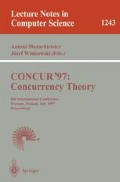Abstract
This paper develops a temporal process algebra, CSA, for reasoning about distributed systems that involve qualitative timing constraints. It is a conservative extension of Milner's CCS that combines the idea of multiple clocks from the algebra PMC with the assumption of maximal progress familiar from timed process algebras such as TPL. Using a typical class of examples drawn from hardware design, we motivate why these features are useful and in some cases necessary for modeling and verifying distributed systems. We also present fully-abstract behavioral congruences based on the notion of strong bisimulation and observational equivalence, respectively. For temporal strong bisimulation we give sound and complete axiomatizations for several classes of processes.
Research supported by NSF/DARPA grant CCR-9014775, NSF grant CCR-9120995, ONR Young Investigator Award N00014-92-J-1582, NSF Young Investigator Award CCR-9257963, NSF grant CCR-9402807, and AFOSR grant F49620-95-1-0508.
Research support partly provided by the German Academic Exchange Service under grant D/95/09026 (Doktorandenstipendium HSP II/AUFE).
Author supported by the Deutsche Forschungsgemeinschaft.
Preview
Unable to display preview. Download preview PDF.
References
H.R. Andersen and M. Mendler. An asynchronous process algebra with multiple clocks. In D. Sannella, editor, European Symposium on Programming, volume 788 of Lecture Notes in Computer Science, pages 58–73. Springer-Verlag, 1994.
H.R. Andersen and M. Mendler. Describing a signal analyzer in the process algebra PMC — A case study. In P. D. Mosses, M. Nielsen, and M. I. Schwartzbach, editors, Theory and Practice of Software Development, TAPSOFT'95, volume 915 of Lecture Notes in Computer Science, pages 620–635. Springer-Verlag, 1995.
G. Berry and G. Gonthier. The ESTEREL synchronous programming language: Design, semantics, implementation. Science of Computer Programming, 19:87–152, 1992.
D.M. Chapiro. Reliable high-speed arbitration and synchronization. IEEE Transaction on Computers, C-36(10):1251–1255, October 1987.
R. Cleaveland, G. Lüttgen, and M. Mendler. An algebraic theory of multiple clocks. Technical report, North Carolina State University, Raleigh, NC, USA, 1997. To appear.
R. Cleaveland and S. Sims. The NCSU Concurrency Workbench. In R. Alur and T. Henzinger, editors, Computer Aided Verification (CAV '96), volume 1102 of Lecture Notes in Computer Science, pages 394–397, New Brunswick, New Jersey, July 1996. Springer-Verlag.
R. De Nicola and M.C.B. Hennessy. Testing equivalences for processes. Theoretical Computer Science, 34:83–133, 1983.
W. Elseaidy, J. Baugh, and R. Cleaveland. Verification of an active control system using temporal process algebra. Engineering with Computers, 12:46–61, 1996.
M. Hennessy and T. Regan. A process algebra for timed systems. Information and Computation, 117:221–239, 1995.
C.A.R. Hoare. Communicating Sequential Processes. Prentice-Hall, London, 1985.
R. Milner. A complete inference system for a class of regular behaviours. Journal of Computer and System Sciences, 28:439–466, 1984.
R. Milner. Communication and Concurrency. Prentice-Hall, London, 1989.
F. Moller and C. Tofts. A temporal calculus of communicating systems. In J.C.M. Baeten and J.W. Klop, edtors CONCUR '90, volume 458 of Lecture Notes in Computer Science, pages 401–415, Amsterdam, August 1990. Springer-Verlag.
X. Nicollin and J. Sifakis. The algebra of timed processes, ATP: Theory and application. Information and Computation, 114:131–178, 1994.
R. Paige and R.E. Tarjan. Three partition refinement algorithms. SIAM Journal of Computing, 16(6):973–989, December 1987.
W. Yi. CCS + time=an interleaving model for real time systems. In J. Leach Albert, B. Monien, and M. Rodriguez Artalejo, editors, Automata, Languages and Programming (ICALP '91), volume 510 of Lecture Notes in Computer Science, pages 217–228, Madrid, July 1991. Springer-Verlag.
Author information
Authors and Affiliations
Editor information
Rights and permissions
Copyright information
© 1997 Springer-Verlag Berlin Heidelberg
About this paper
Cite this paper
Cleaveland, R., Lüttgen, G., Mendler, M. (1997). An algebraic theory of multiple clocks. In: Mazurkiewicz, A., Winkowski, J. (eds) CONCUR '97: Concurrency Theory. CONCUR 1997. Lecture Notes in Computer Science, vol 1243. Springer, Berlin, Heidelberg. https://doi.org/10.1007/3-540-63141-0_12
Download citation
DOI: https://doi.org/10.1007/3-540-63141-0_12
Published:
Publisher Name: Springer, Berlin, Heidelberg
Print ISBN: 978-3-540-63141-5
Online ISBN: 978-3-540-69188-4
eBook Packages: Springer Book Archive

